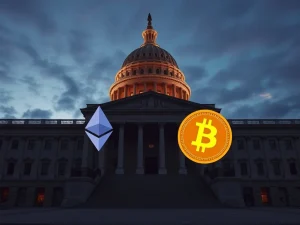Wormhole Tokenomics Overhaul: Crucial Updates Spark Market Excitement

Stay informed with the latest **daily crypto news**. The cryptocurrency market remains dynamic, with significant developments impacting key projects and regulatory landscapes. Today’s headlines feature a major **Wormhole tokenomics** overhaul, new **UK crypto regulation** proposals, and insights into how evolving **SEC listing standards** could shape the future of **Crypto ETFs**. These events are crucial for anyone tracking Bitcoin price, blockchain innovation, and the broader digital asset ecosystem.
Wormhole Tokenomics: A Strategic Overhaul Sparks Excitement
Wormhole, a leading interoperability protocol, announced a significant update to its native W token’s tokenomics. This overhaul introduces a token reserve and offers higher yields for stakers. Wormhole facilitates asset transfers between various blockchains. These changes could profoundly affect the protocol’s governance structure.
According to a Wednesday announcement, three main adjustments are coming to the Wormhole token:
- **W Reserve:** A new token reserve will be funded with protocol fees and revenue.
- **Staking Yield:** Stakers will receive a 4% base yield, with active ecosystem participants earning even higher rewards.
- **Unlock Schedule:** The token unlock mechanism will shift from bulk releases to biweekly unlocks.
Wormhole contributors aim to significantly expand the asset transfer and messaging volume facilitated by the protocol over the next one to two years. More tokens will likely lock as adoption grows and revenue filters back to the company. Wormhole launched its native token on April 3, 2024. The token price jumped over 6.3% on Wednesday following the tokenomics revision. This indicates strong market confidence in the updated strategy.
(Wormhole token price on Sept. 17, 2025. Source: Crypto News Insights)
UK Crypto Regulation: FCA Proposes New Standards
The UK Financial Conduct Authority (FCA) published a consultation paper on Wednesday. This paper outlines minimum standards for crypto companies once they fall under formal regulatory oversight. The regulator seeks to balance innovation and competitiveness with robust consumer protection and market integrity.
David Geale, executive director of payments and digital finance, stated, “We want to develop a sustainable and competitive crypto sector, balancing innovation, market integrity and trust.” He further explained that while these proposals will not eliminate crypto investing risks, they will help companies meet common standards. Consumers will therefore have a better understanding of what to expect. Many proposed requirements mirror obligations for traditional financial institutions. These include rules on operational resilience and controls against financial crime. However, the FCA also opened discussions on issues unique to crypto markets.
Specifically, the FCA is seeking feedback on two key areas:
- **Consumer Duty:** Should the UK’s Consumer Duty, which mandates good outcomes for consumers, apply to crypto companies and activities?
- **Complaint Management:** How should crypto-related complaints be managed? Should consumers refer them to the Financial Ombudsman Service, the UK’s official dispute resolution body?
Feedback is due in October and November. The final rules for crypto firms are scheduled for publication in 2026. This move marks a significant step towards a more structured regulatory environment for digital assets in the UK.
SEC Listing Standards: A Potential Boost for Crypto ETFs
The US Securities and Exchange Commission (SEC) streamlining its approval process for crypto exchange-traded products (ETPs) could trigger a surge of new offerings. Bitwise chief investment officer Matt Hougan commented on this development on Monday. He noted that this streamlining does not automatically guarantee their success.
Hougan believes that the adoption of generic listing standards, potentially as early as October, will likely usher in many new **Crypto ETFs**. However, he cautioned that the mere existence of a crypto ETP does not guarantee significant inflows. “You need fundamental interest in the underlying asset,” Hougan emphasized. He suspects that ETPs built on assets like Bitcoin Cash will struggle to attract flows unless the asset itself finds new life. Launching ETPs positions these products to rally when fundamentals improve. They make it easier for traditional investors to allocate capital to crypto assets. Currently, the SEC reviews spot crypto ETPs on a case-by-case basis. This process can often take months. Issuers must file detailed proposals demonstrating sufficient liquidity and resistance to manipulation in the underlying market.
Broader Market Impact and Future Outlook for Bitcoin Price
These regulatory and protocol-specific developments collectively shape the broader cryptocurrency market. The Altcoin Season Index, for instance, hit a 90-day peak on Sunday. This indicates growing interest in alternative cryptocurrencies. Expectations are high for new Crypto ETFs tracking assets like XRP and Dogecoin to launch soon. Such products could further democratize access to the crypto market.
Increased institutional adoption, spurred by clearer **SEC listing standards** and more accessible investment vehicles, often positively impacts overall market sentiment. This can influence the **Bitcoin price**, as it often leads the market. As regulatory clarity emerges in regions like the UK and the US, traditional finance bridges to crypto strengthen. This creates a more mature and attractive environment for both retail and institutional investors. The continuous evolution of projects like Wormhole also highlights the ongoing innovation within the blockchain space, pushing boundaries for efficiency and connectivity.









